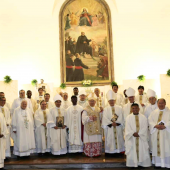Embark on a journey of everlasting challenges, says Japanese archbishop
Faith in God calls us to embark on a journey of everlasting challenges, says Japanese Archbishop Tarcisio Isao Kikuchi, SVD, for the Lenten Recollection 2024 series of Radio Veritas Asia (RVA).
More than 30 years ago, in the late 1980s, he said he was a mission priest in a remote parish in Ghana, South Africa, which he described as “not easy but was a wonderful time.”
That was when the economy was down and all life’s problems, related to poverty and sickness, were present, he said.
“Our people in Sunday masses were always with beautiful smiles, so once I asked them why they are so happy and full of smiles, despite all these life-related problems, and they answered me they have ‘Ghana magic’, “ said Kikuchi.
“It was not magic as such, but a conviction created by the solidarity to help each other. In Ghana at that time, people were sure that at times of difficulties, someone would come and help them,” he said.
They want to be witnesses of unity in diversity, which brings salvation. On the second Sunday of Lent, the first reading was from the book of Genesis talking about Abraham’s testimony of his faith through the trials that he went through, said the Archbishop.
He went on in his recollection with the following:.
“Abraham had this critical choice out of his trust in God, decided to work in unknown territory that no wisdom and knowledge can comprehend. Instead of remaining in his current stability, and security, Abraham chose to follow God’s command to move forward into the unknown.”
“Abraham’s life was not one of stability but of constant challenges as he continued his journey. God appreciated it and blessed Abraham’s life.”
On the second Sunday of Lent, the Gospel of Mark tells the story of Jesus' transfiguration. Peter, having witnessed the glory of God and heard his voice, “Here is my beloved son, here I am," proposes to build three temporary huts, hoping to remain in the radiance of the glory of God.
While Peter stayed in glory, Jesus continued his journey. “We are always invited to join him on this journey through new challenges. Amidst the many challenges in modern society, we try to live out our faith. However, it is not easy to live our faith amid violence against life that continues at no end, such as in Ukraine, Myanmar, and the Holy Land. The tendency is to allow violence to stop violence.”
“But we cannot stop violence by violence. It creates more violence and destroys our lives, which are precious gifts from God. Despite this negative situation against human life, we continue our mission, proclaiming that peace is possible, we have to protect human life, we should not exclude everyone, and we have to walk together in mutual help and support.”
“Sometimes, we are just considered as crazy people talking about dreams or sometimes, we are considered dangers to society having no realistic ideology.”
“When we face negative reaction, we are tempted to hide.. against the cost of our freedom and keep quiet. But if we stop our challenges, we will lose our chance to create hope against our people, especially those in danger of death and vulnerable situations.”
“We cannot be indifferent to the cry of the vulnerable people, we have to be brave enough to face these challenges and move on to proclaim the Gospel with leader Jesus Christ.”
“It is not an easy decision, but people must bear witnesses together in this society, supporting one another. We must thrive as a whole community to speak and witness to the Gospel, we are a people of God who are not looking for comfort but moving forward, facing challenges.”
“Even when we do not find hope, we should not stay in a place of comfort but we should continue challenging ourselves with courage. Only through working together and supporting each other, we create hope for life.”
“As a synodal church and as people of God living in the modern world, let us continue to walk with courage,” said Archbishop Kikuchi. (MTV)
Radio Veritas Asia (RVA), a media platform of the Catholic Church, aims to share Christ. RVA started in 1969 as a continental Catholic radio station to serve Asian countries in their respective local language, thus earning the tag “the Voice of Asian Christianity.” Responding to the emerging context, RVA embraced media platforms to connect with the global Asian audience via its 21 language websites and various social media platforms.














